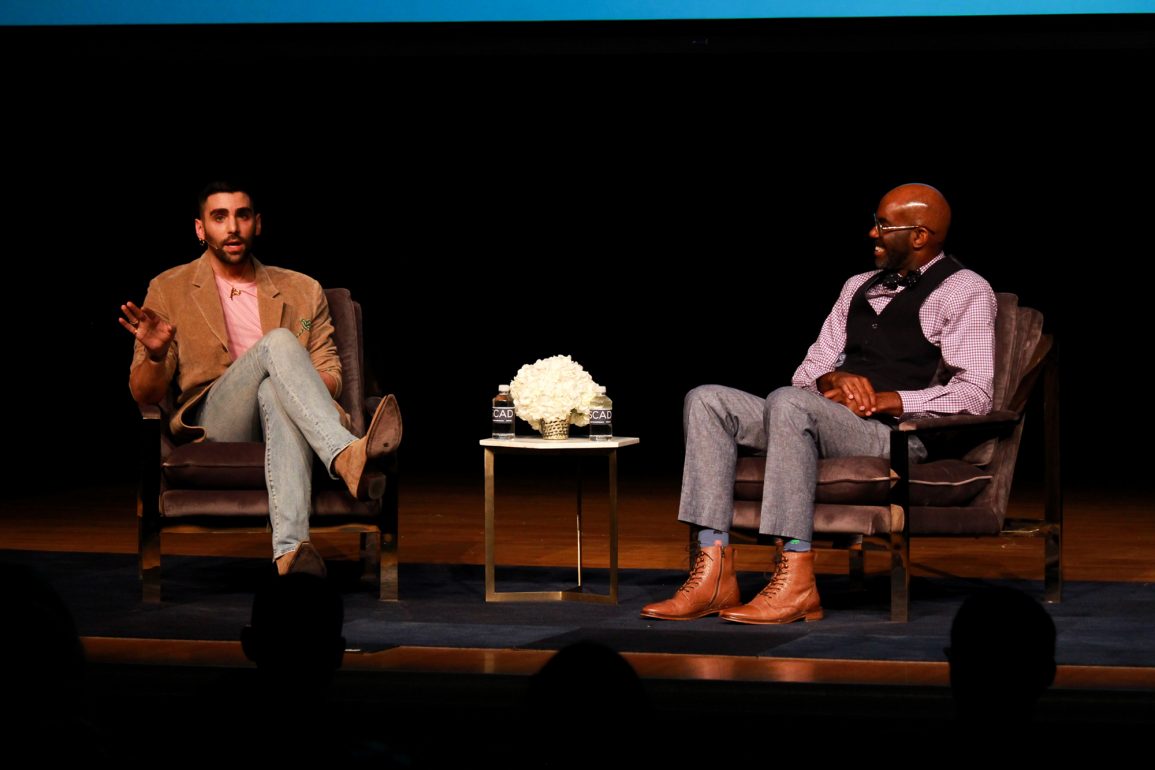In this day and age when Millennials are concerned with topics relating to gender identity, politics and activism, Phillip Picardi is a household name. Having been one of the spearheaders in diversifying his staff, using his voice and staying true to who he is, his dedication has aided in his move from Teen Vogue to the editor-in-chief of Out Magazine. Picardi made his mark in print and digital, one of his most notable achievements being shifting Teen Vogue’s focus from exclusively fashion and beauty tips and trends to having a platform that spreads awareness to our generation and younger.
His journey began as an intern for Teen Vogue where he assisted in setting up furniture showrooms for J. C. Penney. It was an evening of laughs as he recounted his glamorous stories of navigating 20 blocks around New York with chairs and tables in tow. Like most success stories go— moving from intern to director, manager or even editor in chief of a fashion publication— the path to that destination isn’t always easy or glamorous.
When the floor was open for questions, one SCAD student asked about Picardi’s stance on unpaid internships to which he replied “I was an intern for 3 ½ years and I really benefited from that experience. I learned after I finished that internship, which wasn’t unpaid— I got $10 a day— that unpaid internships suck. People should be getting paid for their labor and it benefits a system of people who come from privilege. Gatekeeping exists in the fashion industry and I hope we start working towards a system where we start paying interns because a lot of companies did away with it and replaced it with ‘freelancers.’”
To me, it wasn’t about hiring. It’s about giving people tools to succeed in corporations that marginalize you.”
Age does not tell experience and Picardi, who was only 23 when he accepted his position as Digital Editorial Director for Teen Vogue, expressed how completely out of his element he was. How does one go from talking about a celebrity’s hair to managing a team of 12 people? “Let’s stop trying to be a teen version of Vogue and start being the best version of Teen Vogue that it should be,” Picardi stated as he shared his mantra with the audience. “The audience isn’t looking to us for fashion, but to inform their opinions on the world,” he mentions and with the rumors of the publication closing, a restructure was needed. Picardi hit a major milestone when his project them, for individuals who identify as queer, was approved by Anna Wintour, which he called “an appropriate example for how we should be using seats of power that we acquire.”
It shouldn’t be so shocking that teenagers are now more into politics considering what’s been transpiring in the media lately; and, to much of the crowd’s delight, Picardi agreed, stating “Teen Vogue has ended up becoming a symbol of what a whole generation— Generation Z— stands for, which is that they’re socially informed, they’re ready to make a change and they’re here to kick the asses of everyone who’s in the establishment holding us back from progress.”
Further into the conversation, Picardi jokes about Out Magazine’s former editor-in-chief reaching out to him. While initially hesitant, Picardi soon had thoughts of how to tear apart and rebuild Out so it could reach its full potential.
The key to success, he shares, is always looking forward and always asking how you can evolve. Picardi prides himself on the fact that he assisted with diversifying his staff in Teen Vogue, Out, and indirectly influencing Allure magazine to have a trans- person in leadership. “To me, it wasn’t about hiring. It’s about giving people tools to succeed in corporations that marginalize you.” It’s hard to do so in corporations where they want people who “fit the company culture” which translates to only hiring people who look one way and have the same upbringing.
Being creatives, we’re taught to always challenge ideas from others and even our own, because without innovation there’s stagnation. Ideas aren’t just limited to what fabric to use on a garment, but also include asking why it’s so taboo to talk about gender identity and why inclusion has become more of a trend rather than an authentic conversation.
This question was posed to Picardi on how to talk about taboo topics on your social platforms, to which he responds “It’s a risk. If you want to talk about stuff that’s considered unpalatable to people who like to play it safe, then you’re taking a big risk. My resumé has alienated a lot of people from hiring me for jobs, speaking gigs, etc. You have to make a calculated decision as to whether or not that’s something you’re ready for at this stage of your career. I think there are ways to start conversations about LGBTQ equality or about women’s rights that are really not that radical. If it’s really important to you, would you want to work for someone who didn’t agree?”
When you have a voice and use it to speak about what you’re passionate about, the backlash is apart of the package, but through challenging the norms and being inquisitive is where ideas come to fruition and opposing viewpoints are bridged.
Written by Morgan Daniel
Photo by Nick Thomsen and Daniela Guevara

